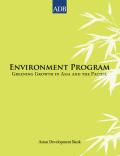The greening of economic growth series ESCAP, its partners and Asia-Pacific countries have advocated "green growth" as a strategy to achieve sustainable development in the resource-constrained, high-poverty context of the Asian and the Pacific region. The conventional "grow now, clean up later" approaches to economic growth are increasingly placing the futures of regional economies and societies at risk. The forward-thinking policymaker is tasked to promote development based on eco-efficient economic growth and at the same time, record more inclusive gains in human welfare and socio-economic progress. In order to assist policymakers in responding to such challenges, ESCAP’s activity on green growth has been developed to focus on five paths: sustainable infrastructure development; investment in natural capital; green tax and budget reform; sustainable consumption and production; and the greening of business and markets. The ESCAP “Greening of economic growth” series provides policymakers with quick access to clear, easy-to-read guidance to specific "green growth" policy tools and actions.
This report describes an evolving policy landscape in Asia and the Pacific characterised by a changing economic reality, rising demand for resources, increasingly apparent impacts of climate change and increased risk and uncertainty. It provides insights into Asian and Pacific resource use trends and outlines key actions that governments can pursue to help bring economic growth strategies in closer alignment with the objective of sustainable development. It also provides examples of strategies for improving resilience to help deal with the increasing levels of risk faced by societies and economies. The report is the product of a combined effort by three institutions: the Asian Development Bank (ADB), the United Nations Economic and Social Commission for Asia and the Pacific (ESCAP) and the United Nations Environment Programme (UNEP).
This summary was prepared by Eldis.
This report reviews the economic and environmental consequences of resource inefficiency in Asia and the Pacific and some of its underlying causes. It examines a range of technical, policy, and institutional responses to encourage corporations and consumers alike to adopt more resource-efficient behaviors, with particular attention to the vital role governments must play in creating incentive structures, encouraging research and development for new technologies, improving institutions and information exchange, and other measures to move the region’s economies toward greater resource efficiency. This analysis is a contribution to the global G8 3R Initiative, which seeks to promote the “reduce, reuse, recycle” approach to waste management. While many of the specific strategies described are not new, the report should contribute to an understanding of the underlying reasons behind resource inefficiency, tools for its analysis, and specific interventions tailored to the Asia and Pacific context.
The report includes case studies from China, India, Japan, Lao, Nepal, Philippines and Thailand.
This publication includes the latest available economic, financial, social and environmental indicators for the 48 regional members of the Asian Development Bank (ADB). It aims to present the latest key statistics on development issues concerning the economies of Asia and the Pacific to a wide audience. Part I of this issue is a special chapter on green urbanisation in Asia. This chapter tackles two growing concerns: environmental sustainability and rapid urbanisation. It argues that proper management of the urbanisation process can mitigate the environmental impacts and lead to a better life for the region's urban residents. Parts II and III comprise of brief, non-technical analyses and statistical tables on the millennium development goals (MDGs) and seven other themes. This summary was prepared by Eldis.

